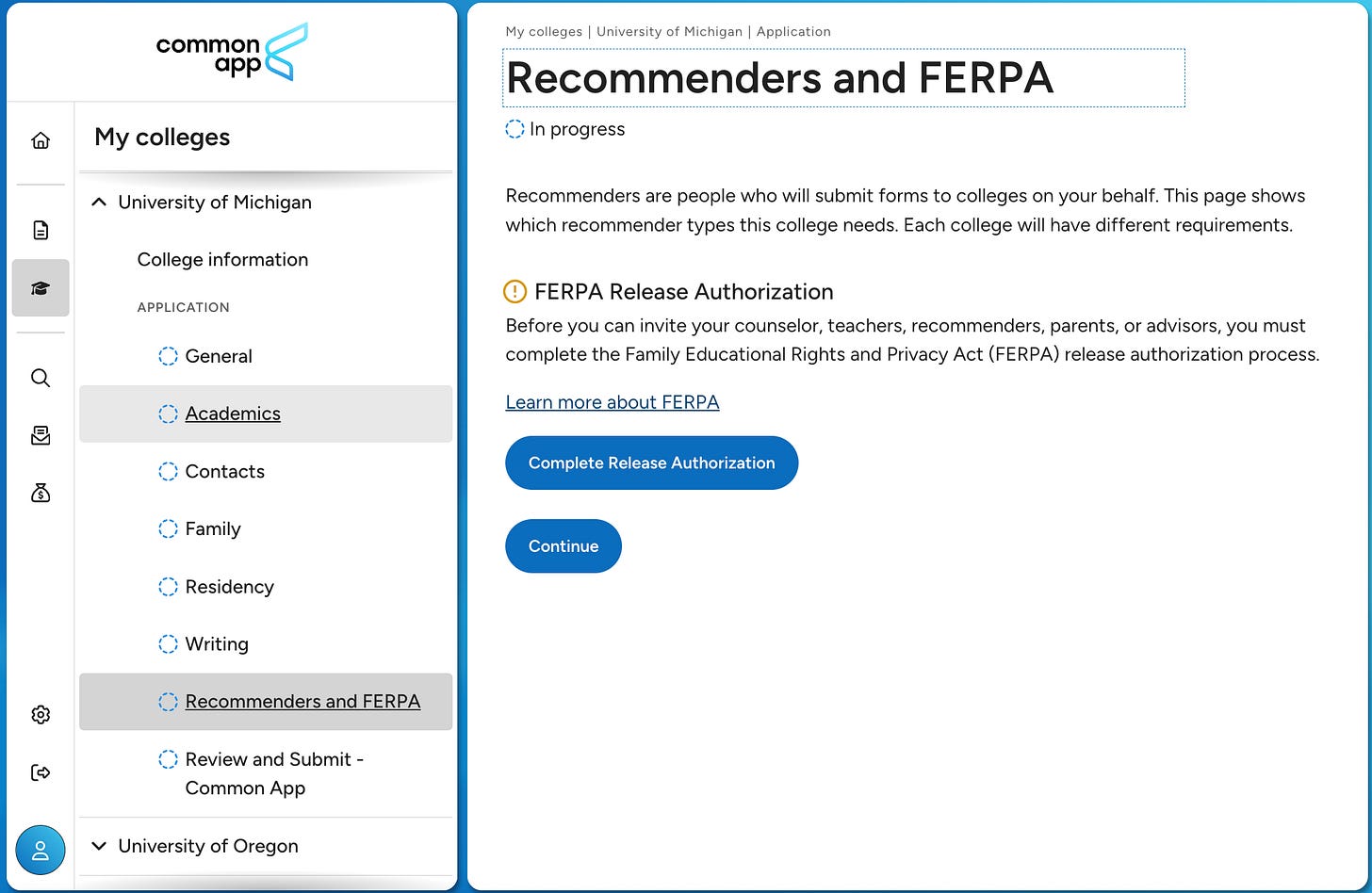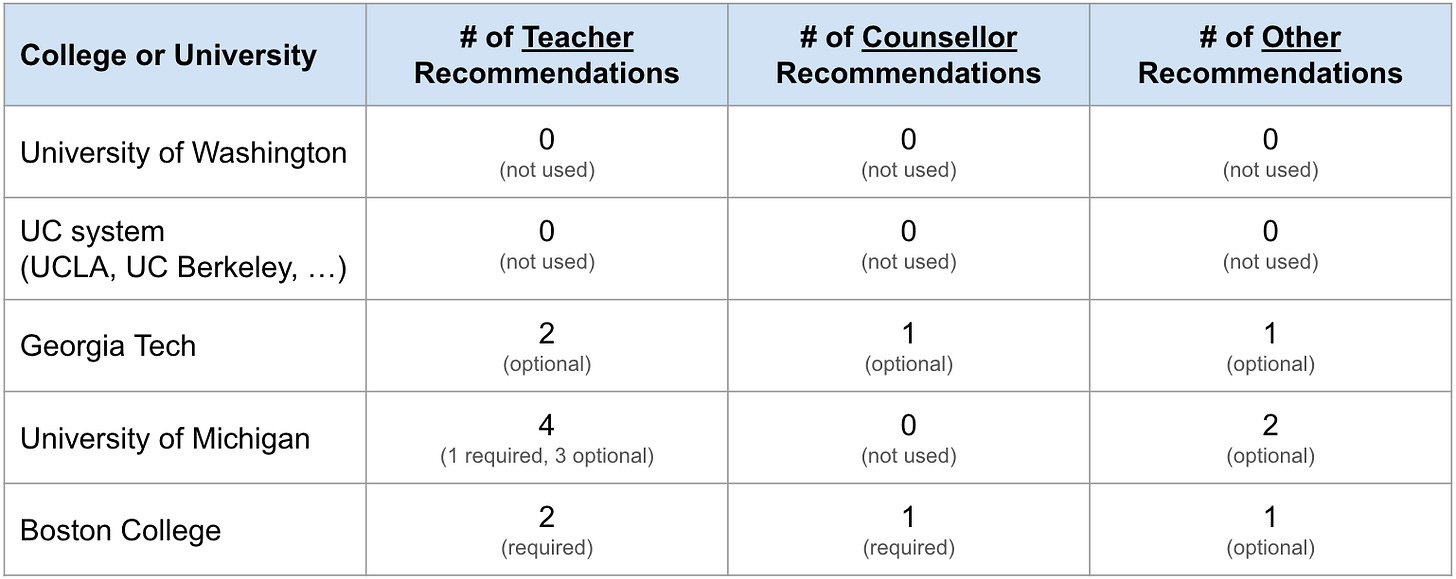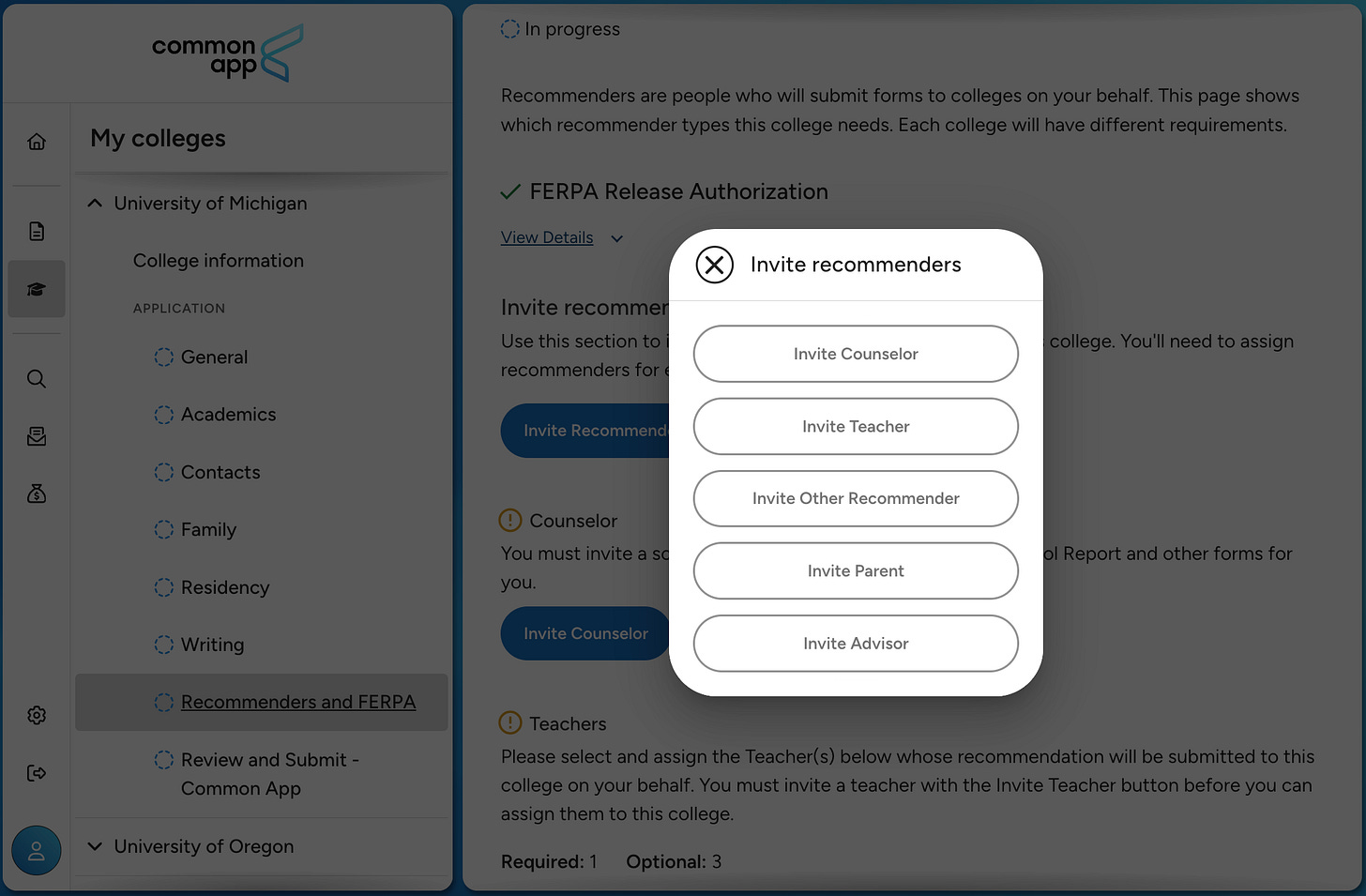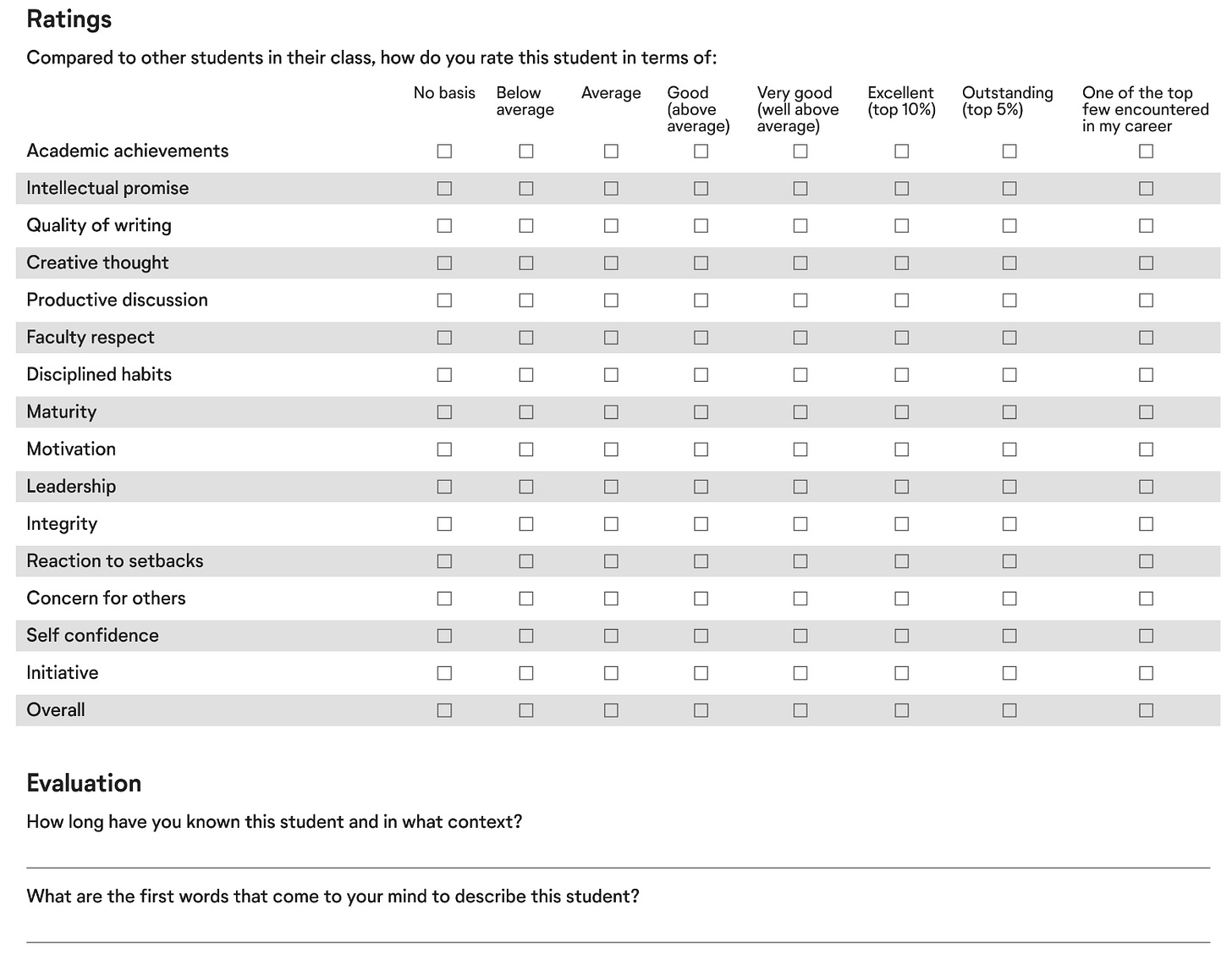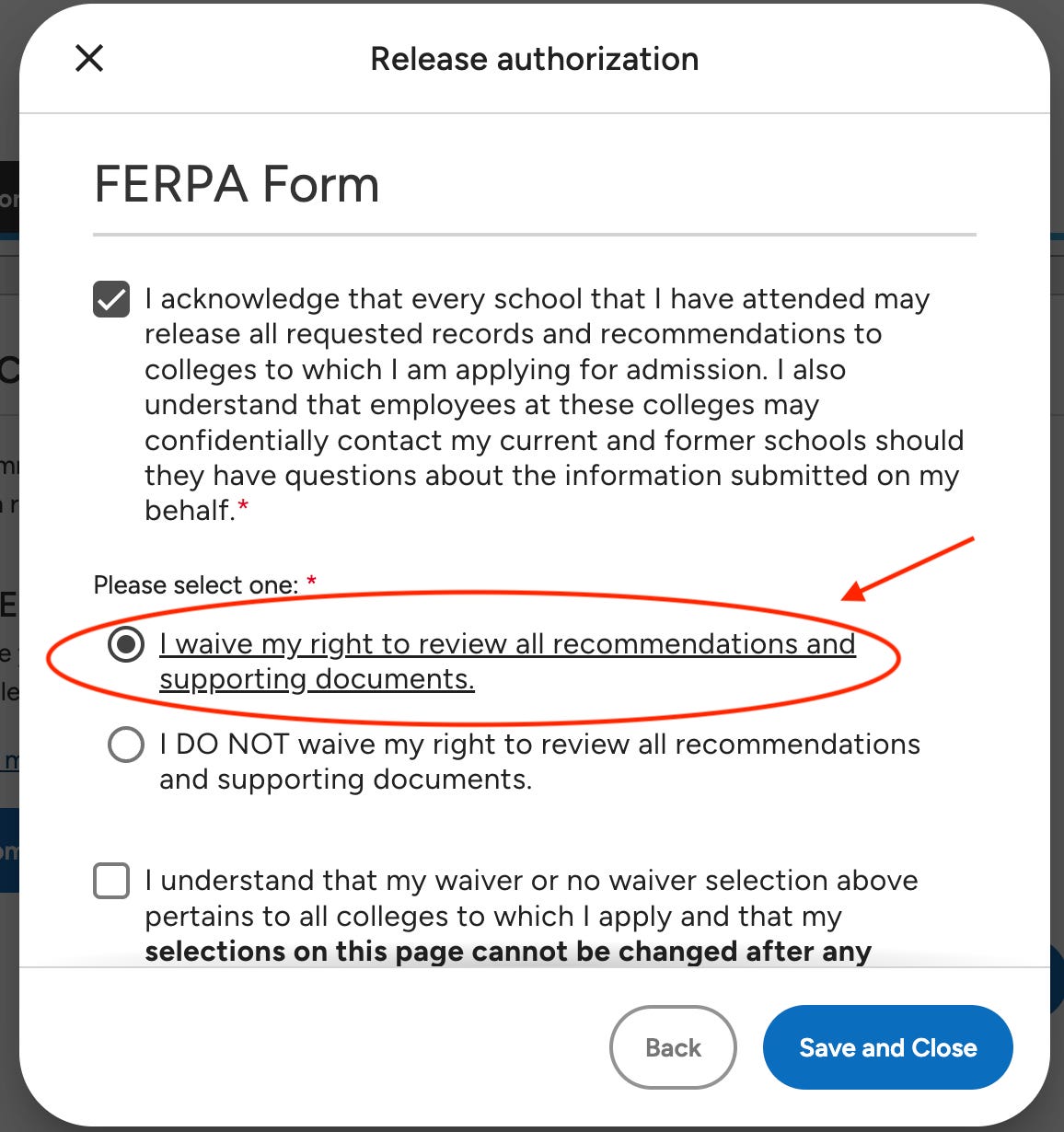Common App Section by Section - Recommenders & FERPA
A complete guide to managing recommendations and FERPA preferences on the Common App.
Recommenders & FERPA
Many, but not all, colleges and universities ask for letters of recommendation.
You’ll complete the recommendations section for each college you’re choosing to apply to, but you’ll complete the FERPA (a legal release) just once.
If you aren’t seeing the ‘Recommenders and FERPA’ section make sure that you have (1) added your high school information to the ‘Education’ section of the Common App and (2) added at least one university that requires recommendations to your ‘My Colleges’ tab.
Recommendations
The colleges and universities you choose to apply to probably have very different requirements for letters of recommendation.
Some examples -
Steps to Submit Your Letters of Recommendation
Make sure that your counsellors and teachers will use the Common App to submit their letters. There are other systems - such as Naviance, SCOIR, and even emailed / uploaded documents. Check with your school about how they’ll submit your letters.
If using the Common App, you’ll find the ‘Recommenders and FERPA’ section of the application in the My Colleges tab for each individual college.
Choose ‘Invite’. You’ll need the email address of each recommender.
Who Should You Ask For A Recommendation?
A best practice is to ask for 2 teacher recommendations and 1 counsellor recommendation.
For teacher recommendations:
Ask teachers that know you well.
Ask teachers from your 11th and/or 12th grade years.
Ask teachers of “core” college prep subjects such as Math, Science, Social Studies, and English.
Ask teachers that best support your major choice, if you have a strong preference.
Ask teachers in person (vs email other less personal communication) - they appreciate this!
Ask teachers as early as possible. Late spring of junior year is usually the best time. Pay attention to any deadlines your high school may set around requesting letters of recommendation.
Some majors at certain colleges - particularly in STEM - require letters of recommendation from very specific high school subjects. E.g. Comp Sci majors at some schools may be required to submit a letter of recommendation from a Math teacher. Double-check the requirements for admission at each school you are applying to.
Example of a Common App Recommendation
Teachers, counsellors, and others (coach, clergy, etc…) are asked to share information about your academic achievements and contributions to learning, leadership, creativity, and character.
Each will complete a unique recommendation form, with questions specific to their role.
Keep in mind that recommendation letters are actually more than just letters. Recommenders are asked to provide ‘ratings’ for the student, across many dimensions important to success in college.
You can find the Common App recommendation templates for teacher recommendations here.
FERPA
FERPA is a United States privacy law.
You'll need to answer a question about this because, by default, FERPA allows you to request and review the recommendation letters your teachers and counsellors write for you. This can put them in an awkward spot—they want to be honest about your strengths and areas for growth, but it’s tough to do that if they know you’ll be reading every word. Keeping their feedback private lets them give admissions a more genuine, balanced view of you.
TL;DR You want to waive your rights to review recommendations and supporting documents. You’ll only need to make this decision once in the Common App, and your choice will apply to all of your colleges and apps.
Understanding FERPA: Your Education Privacy Rights
Privacy Over Your Records: FERPA is a law that protects your privacy by controlling who can access your school records. Once you turn 18 or head to college, only you—not your parents—have automatic access to these records.
You’re in Control: FERPA gives you the right to decide who sees your records. Schools usually need your permission to share your info with others, but there are some special exceptions.
Why This Matters for College Apps: On your college applications, you might see a question asking if you want to waive your FERPA rights, which affects who can read your recommendation letters.
Recommendation: Should You Waive Your Rights?
When it comes to waiving your FERPA rights for recommendation letters, I recommend saying yes.
By waiving your rights, you’re showing that you trust your recommenders and aren’t trying to influence what they write. Colleges tend to view waived letters as more authentic and credible, which can work in your favour.
I Am Concerned I’ll Receive a “Bad” Recommendation - What Do I Do?
If you are at all concerned that one of your recommenders may not provide a super-positive recommendation, there are two “fixes” to consider:
Ask a different teacher or counsellor to write your recommendation.
Apply to schools that do not require letters of recommendation.


